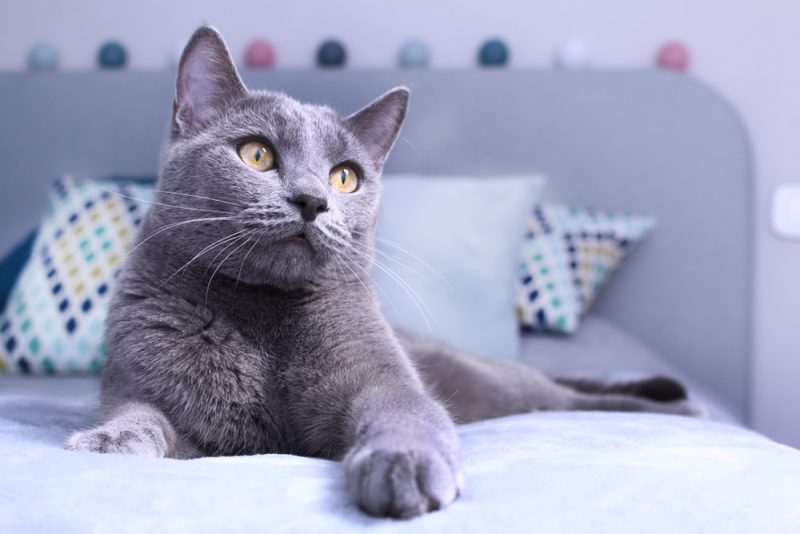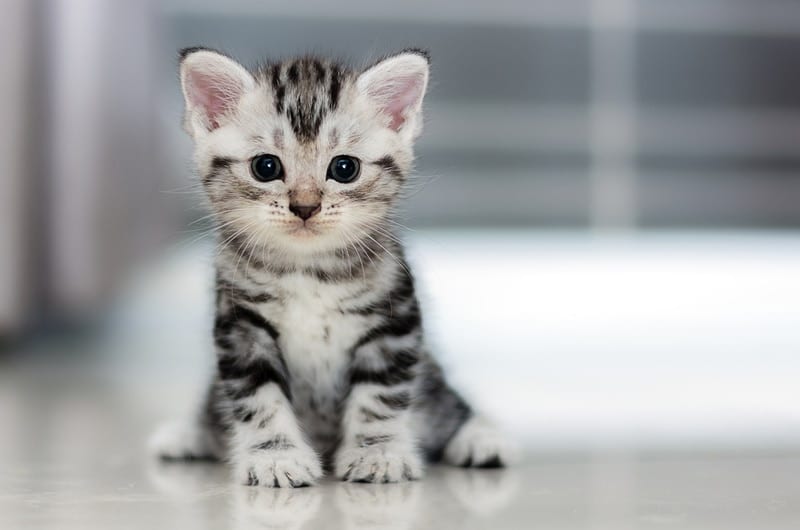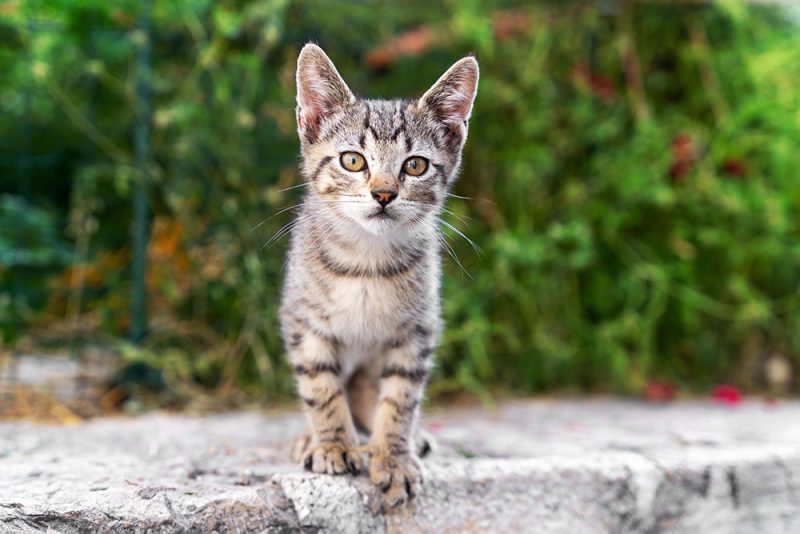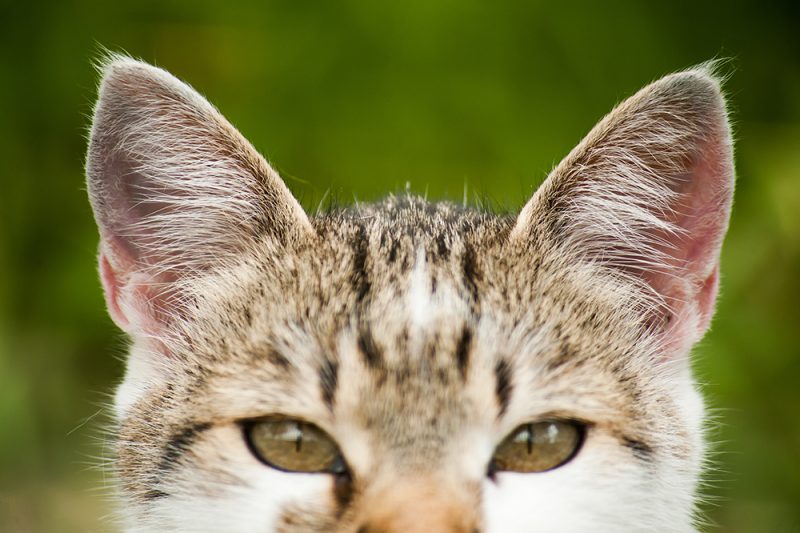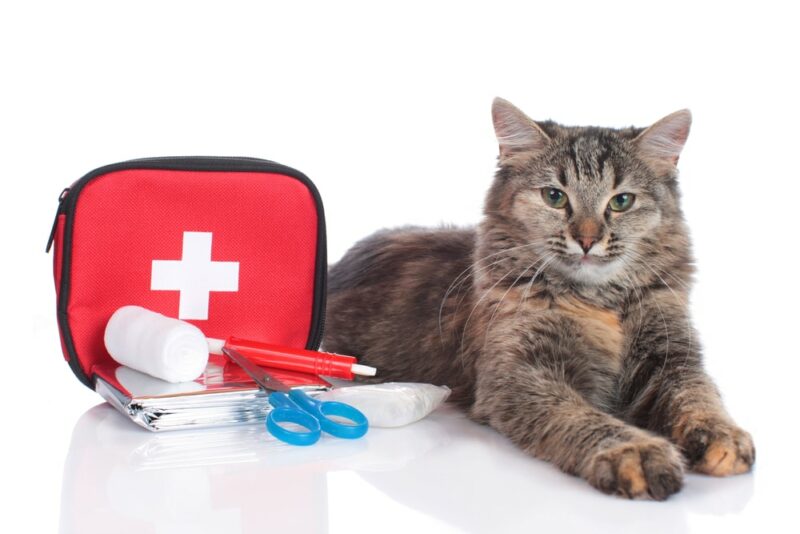In this article
Just because you suffer from cat allergies doesn’t mean you don’t like cats. It’s a cruel twist of fate that you could be allergic to your favorite creature! If you find yourself in such a boat, you might be searching for solutions, such as hypoallergenic cats. Hypoallergenic cat breeds are supposed to be less troubling to those with cat allergies, and there’s apparently a list of breeds that make the cut.
Russian blue cats are moderate-sized felines with gentle, loving personalities. They have incredibly soft coats and an elegant appearance, but are Russian Blue cats hypoallergenic? Technically, no; Russian blue cats are not considered to be hypoallergenic. In fact, no cat is truly hypoallergenic. Let’s take a closer look and see if the Russian Blue cat is the right choice if you suffer from allergies.

What Causes Cat Allergies?
If you suffer from cat allergies, you might not even know what’s causing it. Sure, you know that being around cats flares your allergies up, but what is the actual mechanism by which this happens?
The culprit, as it turns out, is one or more of naturally occurring proteins that all cats produce. Among these, the most common culprit is an allergen known as Fel d1. This allergen is found in cat saliva and is also produced by the sebaceous glands of their skin, and it is considered to be one of the most common allergens for humans. Cats are constantly licking themselves as a method of grooming, which causes the Fel d1 to build up on their coat. This is then released into the air and onto the ground in your home, where it’s picked up by your body and causes an allergic reaction.
Are There Any Hypoallergenic Breeds of Cat?
What is a hypoallergenic cat? Many believe that these are cats that don’t affect allergies. Unfortunately, every cat produces the Fel d1 allergen. Even breeds that are considered hypoallergenic produce the allergen. So, in reality, there are no breeds of cats that you could consider to be truly hypoallergenic, despite there being claims of hypoallergenic cats with exorbitant price tags to match.
What Makes a Cat Breed Hypoallergenic?
So, if no breeds are actually hypoallergenic, then why are they considered to be? One anecdotal concept (which hasn’t been definitively proven) is the claim that some breeds don’t produce as much of the allergen protein as other breeds. This means that people who suffer from cat allergies could have less of a reaction to these particular cat breeds. However this hasn’t been proven in research, and it’s important to note that humans can be allergic to more than one allergen a cat may naturally produce – at least 10 such allergens have been identified thus far.
For those allergic to the Fel d1 protein, another “hypoallergenic” approach is a cat that sheds less or has little to no hair (such as the Sphynx). This is because these cats would only release the allergen into the air via dander, but not through their hair. Nonetheless, they can definitely cause one’s allergies to trigger.
Each person’s allergies are unique. You might be severely allergic or only slightly. If you’re only slightly allergic to cats to begin with, then some cats might not cause a noticeable reaction in you. But if you have a severe cat allergy, then even hypoallergenic cat breeds will likely cause too much of a reaction for you to live with them.
The important thing to keep in mind is that you shouldn’t take your allergies lightly and should seek the help of your physician to both determine whether or not you have a cat allergy, and how severe your allergy is.

Are Russian Blue Cats Good Pets for Allergy Sufferers?
As previously mentioned, no cat breed is truly hypoallergenic. Russian blues are no exception to this rule. However, if you have a minor allergy to cats (as deemed by your physician), then a Russian blue might be a breed that you can handle being around. However, if you have a serious cat allergy, then the best solution is to prioritize your own health and not have a pet cat at all.

Top 4 Tips to Reduce Your Cat’s Impact on Your Allergies
The good news is that there are steps you can take to reduce the impact your cat has on your allergies. If your allergies seem to be very mild, this could be enough of a combination to allow you to live reaction-free with a pet cat.
1. Vacuum Regularly
It might seem simple, but vacuuming regularly can drastically reduce the amount of allergens around your living space. You should focus your efforts on carpets, upholstery, drapes, your cat’s beds, and other places with fabrics. Dander and allergen stick to such surfaces more readily than bare tiled floors.
Regular vacuuming will help to remove all the allergens that settle on the floor. A HEPA vacuum with micro-filtration will ensure that no allergens are being spread as you try to suck them up, which is a common occurrence with regular vacuums.

2. Use HEPA Air Purifiers
HEPA air purifiers can help to remove any floating allergens from the air. They’re simple to use and can also benefit your cat!
3. Consider Cat-Free Zones
It’s good to make a “cat free” zone in your house (such as your bedroom), which is off-limits to your cat. This will provide you with some respite on those days when you feel like your allergies are getting the best of you.

4. Wash Your Textiles
As mentioned, textiles trap allergens. Make sure to wash your linens regularly to remove any trapped allergens. While you’re at it, it’s also a good idea to steam clean your couches as they can trap just as many allergens.

Conclusion
So, are Russian Blue cats hypoallergenic? The truth is, there are no cats that are a great fit for anyone who suffers from severe cat allergies. But if you have only mild allergies to cats, then a Russian blue might be acceptable for you if your heart is set on one. Your best bet is to find a Russian blue and spend some time with them so you can see what sort of reaction you’ll have. Each person is different, and even if Russian blues don’t cause an allergic reaction in everyone who suffers from cat allergies, your experience might be different.
You might be interested in:
- Why Do Cats Sleep at the Foot of the Bed? Reasons for This Behavior
- Types of Cat Furs: Colors, Patterns & Markings (With Pictures)
Featured Image Credit: Camel Case, Shutterstock
